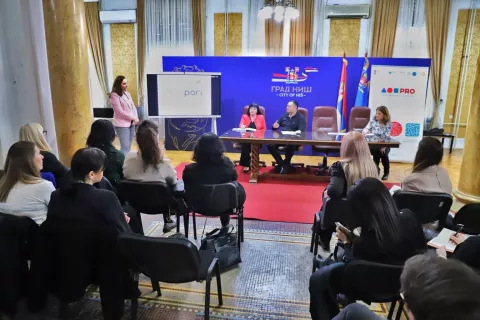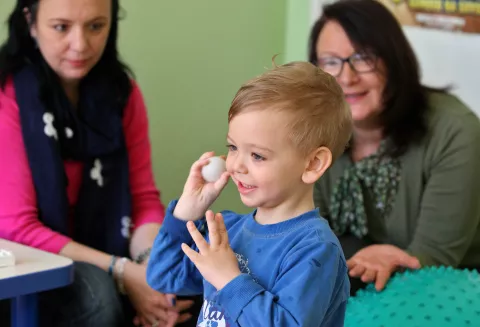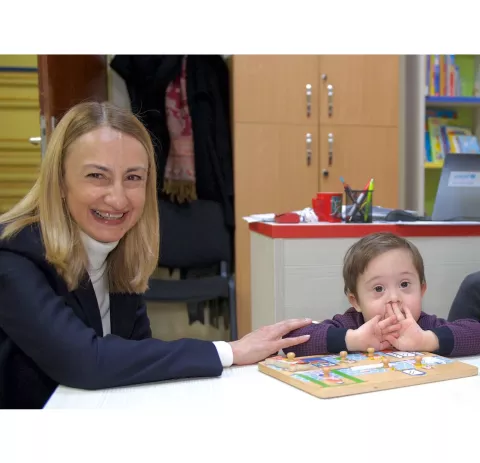The best start
Marko is two and a half years old. He is cheerful, but quiet, unobtrusive.

- Available in:
- Srpski
- English
"Nothing in life should be taken for granted and left to chance. One should respond to minimal changes. There are professional services that have answers to all our questions and we should talk about all problems."
This is how Zdenka Grozdanovic, mother of two children from Leskovac, begins her story about her struggle related to her younger son, Marko.
He is two and a half years old. He is cheerful, but quiet, unobtrusive.
He doesn't speak.
When Marko started attending kindergarten last year, the difference between him and the other children became even more visible, Zdenka says.
"By the time he was 18 months old, a standstill in his speech occurred, he was no longer repeating the things he'd already learned and done. We thought maybe he was a different type of child, maybe he was simply like that, and maybe he was... You always find an excuse."
Counselling unit, a new hope
Marko’s kindergarten teacher and speech therapist suggested that Marko and his mother visit the Developmental Counselling Unit, part of the Primary Health Centre in Leskovac.
They went there every week, twice a week, half an hour per session. The first results were visible after the first month.
Marko said his first, meaningful, YES.
Marko is not the only child getting help from the Developmental Counselling Unit in Leskovac.
Every year 2,000 children and their families get support and 200 new children get referred.
Parents, most often in the period from birth to the age of three, observe problems with speech and motor skills.
The most important thing is to respond immediately and seek help, because that is crucial for the further development of the child.
Developmental Counselling Units provide support to parents and the child when the child has a developmental problem. The time invested in cooperation with parents gives returns in the child's development.
"In addition to working directly with children, the Developmental Counselling Units are also the place where parents face the fact that their child has a developmental problem. And that is, it seems to me, the hardest step. We are there to talk to them, to suppress their fears and to develop their strengths so that they can become their child's therapist, and cooperate with us. So, we are there for the parents to develop hope, to talk about the perspectives, about the future, about the possibilities, about and the strengths their child has. We plan adequate support when there is a developmental delay", says psychologist Snezana Stojanovic Plavsic, who has been working at the Counselling Unit for more than 30 years.
By the time he was 18 months old, a standstill in his speech occurred, he was no longer repeating the things he'd already learned and done. We thought maybe he was a different type of child, maybe he was simply like that, and maybe he was... You always find an excuse.
UNICEF's help – new energy
Thanks to the programme of cooperation between UNICEF and the Ministry of Health, the quality of health care is being improved in 23 Primary Health Centres in Serbia.
The programme involves trainings for health professionals, the introduction of the questionnaire for assessing the child’s development, capacity building of the Developmental Counselling Units through equipping them with furniture, purchasing didactic materials for the assessment and stimulation of all developmental areas. Through these activities, child-friendly and family-friendly counselling units are created.
"The Counselling Unit in Leskovac has been operational for almost 40 years, but has stagnated for the last 20. It hasn’t been recognized as an important part of the health care system.
However, in the last two years we have received support from UNICEF in the area of knowledge innovation, and to connect with local communities, as well as to strengthen our team.
We have received support in the form of tools for work, toys, educational material, and some new instruments for assessing children", Snezana explains.
This support means that working with children is in many respects easier, more creative, and the results are more visible, Snezana believes. An individual work plan is devised for each child in cooperation with kindergartens, and if needed with centres for social work.
The team monitoring the development and progress of the child consists of parents, a psychologist, a speech therapist and a social worker. A medical doctor, peer groups and the broader environment are often included in the individual work plan for each child.
The fastest progress is made by children with speech problems. After regular therapies, they are included in the school system without problems.
More work is needed with children with more serious difficulties and problems, but through hard work they also manage to reach a high level of development, to receive an education, socialize more easily and to adapt to their surroundings.
Lately, more and more work is being done on prevention, stimulation and diagnosis of early developmental disorders, especially in the area of speech.
Irena has ten years of experience in working with children with speech problems. She works with Marko twice a week. The first contact is the most important.

"During the treatments we first try to establish a contact with the child through different didactic and playing materials. Most often those are different puzzles, toys, stickers. We try to establish both verbal and non-verbal communication with the child."
Quickly, often after only a year, the child, with the help from the professionals in the Developmental Counselling Unit and the family, manages to overcome delays in speech development.
The child’s development – how many more words he or she is saying, the way in which they communicate, how they address people, what instructions a child can understand and obey, is monitored every month, in cooperation with parents.
Some children need more time to adapt, to relax and accept help, says Irena Stevanovic Stamenkovic. As every child is different, the therapy and its duration are made on a case by case basis.
Zdenka, Marko’s mother, also regularly participates in his therapies and playing. She has no dilemma that he will soon be able to say everything he wants, thinks and feels.
"I am positive that he will start talking, and this can be realistically expected in a year, maybe even 6 months."




